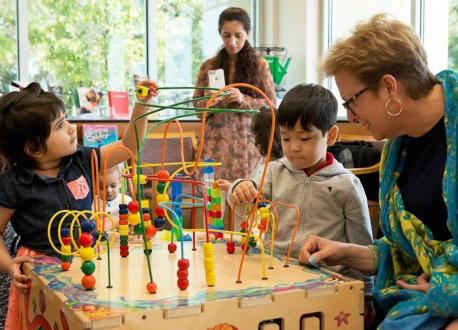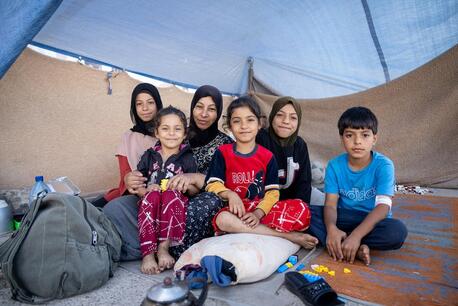
Two Years After Hurricane Harvey, Educators Are Using Lessons Learned
Counseling programs created to help Houston's children heal are now reaching kids in Florida still traumatized by Hurricane Michael.
UNICEF and partners are working tirelessly all over the world to save and protect children.
In times of emergency, children are always the most vulnerable. Hurricane Harvey was no exception. Four days after the slow-moving Category 4 storm made landfall near Corpus Christi, Texas, on August 25, 2017, heavy rainfall and winds up to 130 miles per hour had caused billions of dollars in damage and left approximately 13 million people — including 3 million children — in Texas and Louisiana reeling in its wake.
"Trauma is trauma regardless of your zip code or status, but for those who don't have insurance or relatives with space for them to stay, or money to replace necessities, life after Hurricane Harvey is devastating," Lisa Szarkowski, UNICEF USA Vice President, Humanitarian Emergencies and Executive Communications wrote in a dispatch from Texas three months after the storm hit.
Though largely invisible, trauma is as destructive as the floodwater; it can freeze a child's brain and keep him/her locked in survival mode for life, stunting brain growth in key areas of functioning.
"Though largely invisible, trauma is as destructive as the floodwater; it can freeze a child's brain and keep him/her locked in survival mode for life, stunting brain growth in key areas of functioning. Left untreated, trauma causes lower scores on standardized achievement tests and substantial decreases in IQ, reading achievement and language skills. Traumatized children are 2.5 times more likely to be held back a grade and more likely to be suspended or expelled from school. The correlation between trauma and the school-to-prison pipeline is direct and well-documented."
UNICEF USA stepped up to help in Houston, where nearly 25 percent of all residents live below the poverty line and families already living paycheck to paycheck were struggling to get back on their feet. A rapid needs assessment determined that what Houston's traumatized children needed most was to return to school and resume a familiar routine in a supportive environment. To help them recover, children also needed urgent school-based mental health support.
Storm damage in the greater Houston area was so severe that schools operated in "basic needs recovery mode" for most of the 2017-2018 school year. Students, teachers and administrators struggled to cope with the trauma, but school counselors reported overwhelmingly stressed teachers and a high rate of suicidal ideation among students.

Houston teacher Jackie Garcia, a UNICEF volunteer since 2010, helped prepare kits full of educational supplies for children and teachers in the Houston area after Hurricane Harvey. © UNICEF USA
Working with the Houston Mayor's Office and the Houston Independent School District Superintendent, UNICEF USA prepared "teacher comfort kits," to give 12,600 teachers the materials they needed to help children get back to learning after the storm: dry erase markers, white boards, flip charts, stickers, pencils, pencil cases, markers, pencil sharpeners. To address children's mental health needs, UNICEF USA partnered with The Center for School Behavioral Health at Mental Health America of Greater Houson (MHA), the area's oldest mental health education and advocacy organization.
With a grant from UNICEF USA, MHA created a "Post-Harvey Trauma and Mindfulness Training" that covers psychosocial and trauma support strategies and includes practical guidance on how to avoid triggers, reduce stress and help students cope with grief and loss. To date, facilitators have implemented training across 66 campuses, reaching 3,549 teachers and impacting 50,645 students in kindergarten through 12th grade.
"The City of Houston is grateful for the work of UNICEF USA and its partners for coming forward to help children in need post-Harvey," Houston Mayor Sylvester Turner said one year after the hurricane. "We knew we were in good hands when the largest children's humanitarian organization in the world offered their expertise and resources."
In this episode of UNITE for Children: A UNICEF USA Podcast, Natalie Fikac, Director of the Center for School Behavioral Health at Mental Health America of Greater Houston describes how UNICEF USA and MHA teamed up to address the needs of children traumatized by Hurricane Harvey, and how those programs will be used to help children in Bay County, Florida, who are still struggling after Hurricane Michael.
With hurricanes becoming stronger and more frequent due to global warming, it was only a matter of time before this training would be needed again. That moment came in October 2018, when Hurricane Michael, the third most powerful storm ever to make landfall in the United States, slammed the Florida Panhandle, traumatizing the region's children. Months after the Category 5 storm hit, teachers reported that their students were still bursting into tears every time a thunderstorm passed overhead. According to a survey done through the Bay County school district in the spring of 2019, roughly 30,000 students and staff are still exhibiting clinical symptoms of depression, anxiety or post-traumatic stress disorder (PTSD).
The Miami Herald reported that in mostly poor, rural communities in Florida's Panhandle, devastated families were still camping out in front of their ruined homes, waiting for state or federal assistance to rebuild in June. Some students' relatives had killed themselves in despair. In one extreme case, three girls made a suicide pact, brought razors to school and tried to slit their wrists in front of their classmates. "The current mental health crisis in Bay County is like nothing we have experienced before," school officials wrote in a document summarizing the mental health needs of students in May. "We have the real potential of falling into a full-blown humanitarian crisis should another adverse event occur."
It's already difficult to be a kid [today], and when you compound that with a natural disaster, it's like putting more pressure onto a pressure cooker. So eventually, it's got to come out some way.
To help, UNICEF USA is supporting MHA of Greater Houston's emergency response on all 38 campuses in Bay County. Some 1,681 educators and 38 to 57 school-based guidance counselors will receive the same trauma and mindfulness training developed after Hurricane Harvey. Topics covered will include how to recognize mental health signs and symptoms, suicide prevention, trauma-informed teaching practices and self-care.
"Being a child today is really difficult," says Natalie Fikac, Director of the Center for School of Behavioral Health at Mental Health America of Greater Houston, leader of the Bay County response. "The pressures are much higher. I recently read an article saying that the level of anxiety that our adolescents are currently feeling is higher than the level of anxiety of patients in the 1950's who were in psychiatric hospitals. People can attribute that to lots of different things. Some people say it's social media; some people say it's the pressure of the world these days. But when you take that and it's already difficult to be a kid, and you compound that with a natural disaster, it's like putting more pressure onto a pressure cooker. So eventually, it's got to come out in some way.
"Kids need time, they need space, they need to make sure that their feelings are normalized. There's definitely a need for more therapists. And for educators, especially, there needs to be a lot of training in the area of trauma-informed teaching practices, where teachers can start to look at the behaviors in their classroom and look at the need behind the behavior."
Learn more about how UNICEF responds to hurricanes and other emergencies to save and protect vulnerable children, adolescents and families.
Top photo: In the aftermath of Hurricane Harvey, UNICEF USA President and CEO Caryl M. Stern (far right) traveled to Houston as part of UNICEF USA's efforts to ensure kids affected by the storm could get back to being kids as soon as possible. © UNICEF USA
HOW TO HELP
There are many ways to make a difference
War, famine, poverty, natural disasters — threats to the world's children keep coming. But UNICEF won't stop working to keep children healthy and safe.
UNICEF works in over 190 countries and territories — more places than any other children's organization. UNICEF has the world's largest humanitarian warehouse and, when disaster strikes, can get supplies almost anywhere within 72 hours. Constantly innovating, always advocating for a better world for children, UNICEF works to ensure that every child can grow up healthy, educated, protected and respected.
Would you like to help give all children the opportunity to reach their full potential? There are many ways to get involved.





